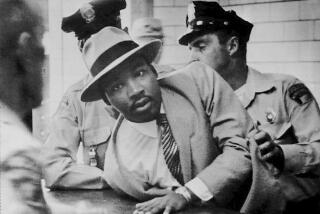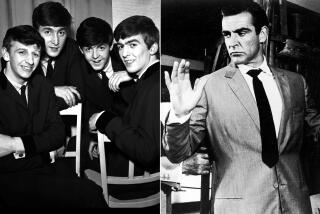A hero of our time and a lion in defense of liberty
- Share via
Two more good books about Winston Churchill, and no doubt there are many more to come. The man himself was extraordinary, and no other statesman of the 20th century performed in so many of its dramas. Sir Martin Gilbert, a veritable Hercules of our profession, has been at it since 1968 and, after 23 volumes of biography and documents, he still hasn’t finished. Less monumental biographies are available in all sizes. Last year’s crop was Roy Jenkins’ 1,000 pages and my own 370: in British terms, “long” and “medium-size” respectively. To my surprise, the Claremont Review described mine as “short.” How, then, will these much shorter works by John Lukacs and John Keegan be assessed?
In “Churchill: Visionary, Statesman, Historian,” Lukacs offers the reflections of a wise, experienced, philosophically minded historian, long fascinated by Churchill and never tired of contemplating his place in history. His is a book to make readers wish to read a biography, while Keegan’s brief biography may make readers wish to read a longer one. Keegan manages to incorporate almost everything that really mattered in Churchill’s life into a very readable narrative soundly founded on the history his hero moved through and, to some extent, made.
Each acknowledges, as all other Churchill-watchers have done, that the man is ultimately unclassifiable, un-sum-up-able. Seeking in their different ways the heart of the Churchillian mystery, they converge on two fundamentals: his roots in History, and his love of Liberty.
Not only did Churchill know a lot of history, write history and make history, he was possessed by a conviction that the history of Britain displayed the development of good principles of government -- accountability, freedom of the press, rule of law and so on -- which had been spread around much of the world through the British Empire and Commonwealth and its amazing byproduct, the United States; both of them, empire and America alike, great political institutions working for good in the world. This was the source of his belief in the “special relationship” and the cause of his confidence, in the desperate dark days of 1940, that the United States would wake up to the fact that Hitler’s Germany was antithetical not only to the values of Britain and its empire but to the values of America as well.
With America’s entry into the war in 1941, his confidence appeared to have been justified. But he never understood how differently the special relationship was valued on the other side. He was mortified to discover that America’s war aims and postwar policy included the dissolution of the British Empire. This, he felt sure, was not for the greater good of humankind. Looking at what has happened since then in some of the lands of its precipitate deconstruction, perhaps we might agree. The other fundamental these authors join to pinpoint was Churchill’s human “decency”: the quality dear above all else to Churchill’s contemporary, George Orwell. Given his egotism and willfulness, Churchill possessed an essential decency that was not always easy to see. But it was deep and constant, for all that it was set in an old-fashioned paternalist mold. Having had a rotten childhood himself, he made sure his children had a good one. He was a loving and faithful husband, albeit a sometimes maddening one. Keegan strikingly defines him as a “libertarian.” He was one of the founders of the British welfare state, he stood up for workers’ rights against their employers (but not against the state!), he readily sympathized with underdogs, he was passionate about the liberties of the subject and the protections provided by the rule of law, and in World War II his determination to save the liberties of the British was matched by an equal determination to retrieve the liberties of the peoples of Western Europe “now gripped and tormented in a base and cruel servitude.”
Although fascinated by war (and, thank God, good at conducting it), Churchill was aware of his addiction and devoted most of his years as an international statesman to peacemaking. He liked winning, whether it was in argument or battle, but, once he had won, his inclination was to be generous and charitable. Lukacs rightly makes much of this, reminding us that the moral and motto of his six-volume memoir-history, “The Second World War,” was: “In War, Resolution; in Defeat, Defiance; in Victory, Magnanimity; in Peace, Goodwill.”
Each book gains force from its author’s particular emphases and insights. Keegan, for instance, reminds us of Churchill’s many accidents and ailments, numerous enough to make his wartime exertions and travels (40,000 miles) all the more astonishing. He advances a disputable point of view in his two pages about the relative uselessness of the resistance movements in occupied Europe but gives a fine and fair picture both of Churchill’s obsession with operations in and northward from the Mediterranean and of his reluctance to back the Normandy invasion, a reluctance understandably irritating to his American allies. In a moving conclusion, Keegan pays just tribute to Churchill’s splendid wife, “Clemmie” (as he always called Clementine), and confronts the curious phenomenon that “those who remember him most fervently seem more numerous in North America than in the United Kingdom.” This, he suggests, is because “Churchill’s memory has been subsumed within something larger, the popular memory of the Second World War, which has been transformed into a national saga.” Alas, that saga does not grip all of us. Such have been the accompanying deformations in British society since the 1960s that, during an anarchic “green” demonstration in London last summer, Churchill’s statue in Parliament Square was smeared with green paint and topped with a punk hairdo.
About half of Lukacs’ book is given to contemplation of Churchill’s statesmanship from the “visionary” early 1930s, when he sounded the tocsin about Hitler, through to the early 1950s, when he sought to explore the possibility of what we came to call detente. Lukacs very reasonably argues that Churchill’s perceptions of Joseph Stalin were more sensible than FDR’s, that his perceptions of the Soviet Union after the death of Stalin were more sensible than those of President Eisenhower and John Foster Dulles, and that the way his special relations snubbed him was regrettable. (Churchill loathed Dulles.) Lukacs’ admiration for Churchill’s “historianship” produces some enjoyable ripostes to Churchill’s critics, even the loftiest of them.
But Lukacs’ concluding chapter is the most arresting one: It is the account he wrote at the time of his three-day visit to London for Churchill’s funeral in January 1965. He fears it tends to the sentimental, but I would rather call it emotional -- not at all surprising in an admirer of Britain, proud of his European heritage and, like all the others assembling in London, a grateful beneficiary of Churchill’s role on the world-historical stage. He observes all those others with an equal eye: the royals, the cockneys, the prime ministers and presidents (but where was President Johnson?), the “thinning and threadbare and sorely tried middle class,” the Polish veterans and the French resisters, the middle-age airmen who, slimmer and younger, had won the Battle of Britain, the Churchill family “walking with beauty and dignity behind the coffin ... no signs of the ravages of life, only the tragic quiet of discipline on Sarah Churchill’s pale jeweled face....”
It is a remarkable evocation of the event, made more impressive by Lukacs’ solemn reflections on its meaning for Britain. The end of an era, indeed ... with the green-paint people already gathering behind the scenes.
More to Read
Sign up for our Book Club newsletter
Get the latest news, events and more from the Los Angeles Times Book Club, and help us get L.A. reading and talking.
You may occasionally receive promotional content from the Los Angeles Times.









